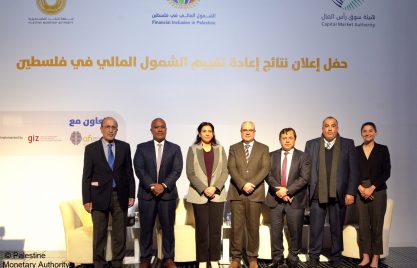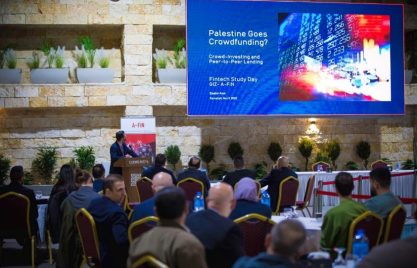New project kicked off: GIZ and Sanad Fund will support the PMA in enhancing its consumer relations halls – an important and unique access point for Palestinian financial consumers to receive advice and information about their rights.
With the aim of strengthening consumer protection and financial literacy in Palestine, the Palestine Monetary Authority (PMA), GIZ and the SANAD Fund for MSME’s Technical Assistance Facility agreed on a joint project supporting the PMA’s consumer relations halls today. With the presence of the Governor of the PMA, Mr. Azzam Shawwa, the German Representative Mr. Peter Beerwerth, and from Finance in Motion, Manager of the SANAD Fund’s Technical Assistance Facility, Mr. Jacob Ole Nestingen, the institutions met on 15th of May 2017 in Jericho to kick off this new initiative by signing a Memorandum of Understanding.
The Governor of the PMA, Mr. Azzam Shawwa, expressed the importance of the project for the PMA and financial consumers in Palestine. His Excellency thanked the Federal Republic of Germany, GIZ and Sanad TAF for their cooperation and support to enhance the strategy of financial inclusion, pointing out that Germany is one of the biggest supporters and donors to the Palestinian people.
Peter Beerwerth, Head of the Representative Office of the Federal Republic of Germany in Ramallah, highlighted the role of responsible finance in the financial systems development approach of the German Development Cooperation: “Making informed decisions is crucial when dealing with financial products. Financial education thereby cannot start early enough, and the availability of targeted advice for consumers in the way how the PMA will offer it is a model case in the region.”
With a series of trainings and new equipment, the services of the consumer relations halls are planned to be enlarged with the support of the German Cooperation, implemented through the GIZ “Promotion of Microfinance in the MENA Region” programme, as well as the Luxembourg-based SANAD Fund’s Technical Assistance Facility, which is financed by the German Ministry of Cooperation and Development, the European Union, the Swiss State Secretariat for Economic Affairs, and the Austrian Development Bank.



